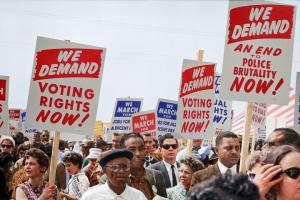
Our Christian faith calls us to seek justice, love mercy, and walk humbly with our God (see Micah 6:8). We must examine the Civil Rights Act through this lens to understand why it is essential for Christians to embrace this historic legislation and celebrate the day it was passed.
The Civil Rights Act of 1964 was a landmark law aimed at ending racial segregation and discrimination in the United States. While some may view it as a purely political or social issue, the Act has deep implications for our faith and our commitment to the gospel message of love and equality.
In this article, we will delve into the biblical foundation for embracing civil rights. We will also explore the impact of the Civil Rights Act on society and religious communities, address misconceptions and resistance within the Christian community, and provide practical steps for Christians to celebrate Civil Rights Act Day by continuing to fight for justice and equality.
A Brief History of the Civil Rights Act
Before we can fully grasp the significance of the Civil Rights Act, it is crucial to understand its origins. The Act was signed into law by President Lyndon B. Johnson on July 2, 1964, after a long and arduous battle against racial discrimination. It outlawed discrimination based on race, color, religion, sex, or national origin in public places, employment, and federally funded programs. This groundbreaking legislation marked a turning point in American history and laid the foundation for a more inclusive and equal society.
The Civil Rights Act not only addressed the immediate need for racial equality. It also paved the way for subsequent laws and movements against other forms of discrimination.
The Biblical Foundation for Embracing Civil Rights
As Christians, our faith is grounded in the teachings of the Bible. Throughout Scripture, we find a consistent message of God’s love for all people and His call for justice and equality. The Apostle Paul reminds us in Galatians 3:28 (NIV):
“There is neither Jew nor Gentile, neither slave nor free, nor is there male and female, for you are all one in Christ Jesus.”
This verse highlights the fundamental equality of all believers in Christ. It serves as a powerful reminder of our duty to stand against any form of discrimination or injustice. Additionally, Jesus Himself demonstrated radical inclusivity in His ministry. He repeatedly shattered societal norms and reached out to those who were marginalized by society. His interactions with women, Samaritans, and tax collectors challenged the prevailing prejudices of His time and set an example for us to follow.
Christian Responsibility to Promote Equality and Justice
As followers of Christ, we have a responsibility to promote equality and justice in our society. The Civil Rights Act aligns with the core principles of our faith and provides us with a framework for pursuing these ideals.
We are called to love our neighbors as ourselves and to stand up for the oppressed and marginalized. This means actively working to dismantle systems of inequality and advocating for the rights and dignity of all individuals. Embracing the Civil Rights Act as Christians means recognizing the inherent worth and value of every human being and affirming their right to equal treatment under the law.
The Impact of the Civil Rights Act on Society and Religious Communities
The Civil Rights Act has had a profound impact on American society. It challenges deeply ingrained prejudices and fosters greater inclusivity. In the past, it led to increased opportunities for minority groups in education, employment, and public life through affirmative action.
Religious communities have also been influenced by the Act. Over the years, it has prompted self-reflection and a reevaluation of traditional beliefs and practices. Many churches and religious organizations have embraced the principles of the Civil Rights Act by actively working to create more diverse and inclusive communities. However, there are still challenges to overcome, especially in light of the Supreme Court’s recent decision to dismantle affirmative action in higher education admissions. Obviously, there is still much political and religious opposition to the Act’s ideals of equality and justice.
Overcoming Misconceptions and Resistance within the Christian Community
Unfortunately, misconceptions and resistance within the Christian community abound when it comes to embracing the Civil Rights Act. Some argue that the Act infringes on religious freedom or conflicts with certain biblical teachings. However, it is important to recognize that the Act does not seek to undermine religious beliefs or practices. Rather, it aims to ensure all individuals are treated with dignity and fairness, regardless of their race, color, religion, sex, or national origin.
Embracing the Civil Rights Act does not mean compromising our faith. Instead, it means living out the gospel message of love and equality. To understand this, all we have to do is look at the lives and work of civil rights leaders such as Martin Luther King Jr., Desmond Tutu, and Dorothy Day. These, and too many other individuals to name, understood the inherent connection between faith and justice. They recognized that the gospel compels us to stand against injustice and discrimination. Their legacy of civil rights activism serves as a powerful example of how Christians can and should embrace the Civil Rights Act and other such legislation as a means to promote equality and justice.
Lessons Learned and Ongoing Challenges in the Fight for Equality
While the Civil Rights Act was a significant milestone in the fight for equality, there are still ongoing challenges that we must address as Christians. Racism, discrimination, and systemic inequalities persist in our society. It is our duty to continue the work of those who came before us. We must learn from the lessons of the past and remain vigilant in our pursuit of justice. This requires engaging in difficult conversations, examining our own biases, and actively working to dismantle systems of inequality.
Celebrating Civil Rights Act Day as a Christian: Practical Steps and Actions
We should celebrate Civil Rights Act Day as Christians with more than just words. We need to take action. Especially now.
We must be willing to step outside of our comfort zones, engage in acts of solidarity, and use our voices to advocate for change. This can involve supporting organizations that fight for civil rights, volunteering in underserved communities, and educating ourselves on the history of racial injustices. It also means examining our own hearts and repenting of any prejudices or biases we may hold.
By taking these practical steps, we can truly embody the love and justice of Christ and make a difference in the lives of those who have been marginalized.
Embracing the Call for Justice and Equality as a Christian
The intersection of faith and freedom is a powerful place where Christians can make a significant impact in the pursuit of justice and equality. Embracing the Civil Rights Act is not only a political or social responsibility but also a deeply spiritual one. As Christians, we are called to be agents of change, standing up against discrimination and working towards a society that reflects the love and inclusivity of Christ. By celebrating Civil Rights Act Day, we can honor our faith and contribute to a more just and loving world. Let us heed this call and continue the legacy of those who fought for civil rights before us.
Why not join the movement for justice and equality by actively supporting organizations that fight for civil rights and engaging in acts of solidarity in your community?
The Bible tells us to:
Rejoice with those who rejoice; mourn with those who mourn. (Romans 12:15, NIV)
Right now, your brothers and sisters are hurting. Meet with them, weep with them, and then comfort them as much as possible. Stand or sit beside them and support them in whatever way you can.
Together, we can make a difference.

















